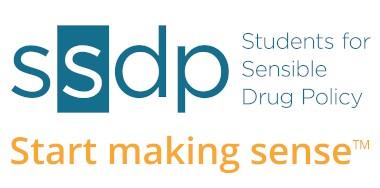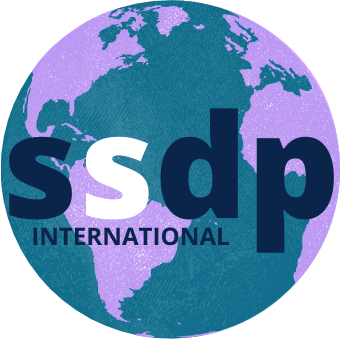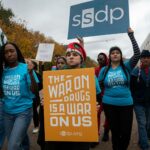Just Say Know Drug Education
Students for Sensible Drug Policy believes that students should be an overall part of any campus and community prevention and intervention strategy.
Get Involved Today
Questions? Comments? Email Luis at luis@ssdp.org.
SSDP Peer Education Program
Our SSDP Peer Education program seeks to empower students in our network to analyze the relationship between drug policy and drug use by providing evidence-based drug information, teaching students to recognize and address dangerous behaviors and unhealthy attitudes, and promoting prosocial and harm reduction oriented behaviors and attitudes.
SSDP is in a uniquely qualified position to do so because:
Federal cannabis prohibition is at its end, but sensible drug policy is more relevant than ever. The United States has just ended a significant portion of the War on Drugs with the increasing approval and enactment of cannabis legalization. However, we as a society need to take time to recover – mentally, emotionally and physically – from our failed drug policies, relearn why we started this fight in the first place, and reflect on what values we should hold about drug policy and drug use culture as we move forward. SSDP peer education will further the mission, vision, and values of the organization by promoting education, not incarceration!
Goals for SSDP Peer Education Program
SSDP Peer Educators achieve this goal through three primary activities
See the Peer Education Program 101 Powerpoint here
SSDP Peer Education was launched at the SSDP 2016 International Conference with a presentation by former Pacific Region Outreach Coordinator, Frances Fu, ’11, and former SSDP Director of Drug Education, Vilmarie Narloch, PsyD ’09. At that time, the Training Curriculum went live, providing access to 12 lessons and accompanying resources. Since then, over 80 SSDPers have engaged in the training, and their feedback has helped us to develop the current 3rd Edition.
To become an SSDP certified Peer Educator, members complete each lesson by reading, watching, and reviewing the resources available, and complete a set of reflection and feedback questions for each of the lessons. Along the way, SSDP Staff or a certified peer educator will provide support, answer questions, and keep track of their progress.
Additionally, for students who prefer a more interactive audio/visual format, webinars for each of the lessons will be made available on a regular basis. Members can also contact Luis at luis@ssdp.org to schedule webinars for their chapter!
Once one has completed all mandatory training curriculum lessons, SSDP Staff will confirm completion of the program, and they will receive an official completion certificate in the mail. Once one is an SSDP certified Peer Educator, they can present our Just Say Know drug education and harm reduction modules!
If you are interested in creating a module, contact Luis, who can help you through the process!
Peer Education on Campus
Integration on Campus and Community
SSDP Peer Educators strive to promote harm reduction on campuses and in college communities where treatment and resources are not always harm-reduction based. SSDP Peer Educators will be encouraged to work with existing campus and community resources, and learn how to navigate different philosophical conflicts surrounding drug use behaviors, treatment, and recovery.
On Campus Staff Support: SSDP Peer Educators are encouraged to work closely with a health and wellness administrator on campus. Staff can connect students with administrators, and university or community specific committees that they may otherwise not have had access to.
If campus support does not exist: If the SSDP Peer Educator is on a campus that doesn’t have a robust health services program, they are encouraged to collaborate with community members and organizations (ex. health/social work) and put on these trainings as educational events. SSDP Peer Educators are not meant to serve as experts on substance use, but as facilitators in connecting students with facts and resources.
Encouraging campus and community training opportunities: SSDP Peer Educators will be encouraged to undergo existing health and wellness training opportunities that already exist on campus or in the local community. In addition, SSDP Peer Educators will be encouraged to work with their campus’ health services program to deliver these trainings as key stakeholders in their own health and wellness and that of their campus communities.
SSDP Peer Education and CAT Points
SSDP Peer Education objectives will be viewable under the “Training and Education” category. Below are some examples of actions your chapter will be able to take:
Just Say Know Drug Education Lessons
SSDP Peer Educators will be able to present and create educational modules, starting with Just Say Know.
Just Say Know
Just Say Know is a series of drug education modules aimed at promoting open and honest dialogue around commonly used substances. The program aims to equip young people with harm reduction tools and skills as it relates to the specific substance, but can be applied to substance use generally.
Before you dive into the presentations, please review Just Say Know: A Guide to Presenting for an overview of how to best utilize these resources.
Additional Resources
Working Group Contributors
Start a chapter of SSDP and join the youth movement to end drug prohibition.
Start an SSDP Chapter Today!
We do this work because the war on drugs is a war on us.




